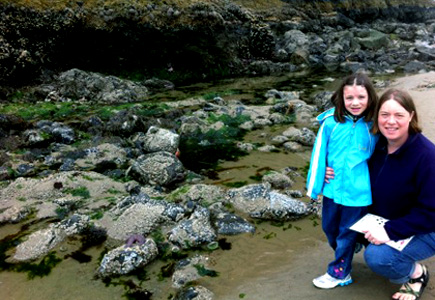
Megan Elwood Madden
Professor of Geochemistry - University of Oklahoma
This profile has been adapted in part from an original interview conducted by Susan Niebur for the Woman in Planetary Science website. To read the full original interview click here.
I grew up in central Illinois and the upper peninsula of Michigan. If I hadn't spent my summers in the Upper Peninsula, I doubt I would be a geologist today -- it's an amazing feeling to know you are standing on rocks that are over one billion years old!
When I was a kid, I used to lie on our dock and stare up into space trying to grasp just how big the Universe was, how long ago the light left the stars before it reached me and much more. I knew then that I wanted to be scientist and learn more about the world and the Universe around me.
I always loved all areas of science; however, geology seemed like a good choice for me since it applied all kinds of science -- biology, chemistry, physics -- to study the natural world. I took physical geology as a freshman in college and I was completely hooked. As a geologist you can look at rocks and tell fantastic stories about the processes and environments in which they formed.
I was introduced to planetary geology in grad school. My advisor gave me a choice of many projects to work on and I decided to try modeling chemical weathering on Mars. I haven't looked back since!
I teach and do research in the School of Geology and Geophysics at the University of Oklahoma.
I spend about half my time on teaching: "Introduction to Geology," "Geochemistry," "Planetary Geology," and a technical writing class called "Geowriting." The rest of my time I spend working with students in the lab.
I study the geochemistry of planetary materials and how they react with water at the surface of planetary bodies. For example, my students and I conduct experiments where we measure how long it takes for minerals to dissolve in water. We also mix gases and ice to try to form materials called gas hydrates. I use these experiments to test hypotheses on how long water might have been present in some areas of Mars as well as the source of methane on Mars, which has recently been observed in Mars' atmosphere.
When I was in graduate school, the Mars rover Opportunity landed at Meridiani Planum. A few weeks into the mission the team held a press conference -- I was watching the tiny TV in the lab with my lab mates when they announced the discovery of a mineral called "jarosite" in the rocks they were exploring. I was so excited -- jarosite is an iron sulfate mineral that had been popping up in the models I'd been running of chemical weathering on Mars! Sometimes you just happen to be doing the right thing at the right time ...
My high school science teacher was always so excited about learning and exploring new things. He would take us out in the field to collect water samples, or test rockets or explore caves. He had so much energy and enthusiasm for teaching and science that it was infectious. He inspired me and many of my classmates to become scientists.
My advice would be to set moderate-term goals and work towards them every day. At times it can seem overwhelming, but if you can see how each small step you take leads you to your goals it becomes more manageable. Life as a scientist can be busy and at times frustrating, but it is also very rewarding.
Also, I'd like students to know that you can be a successful scientist and have interests outside of the lab as well. There are many young scientists now who balance work and family or hobbies. Even though people like to "brag" that they spend 80 hours a week in the lab; that is not actually the norm. You can be a productive and successful scientist for 40-50 hours a week.
I like to read, hike and kayak with my family. I especially like to explore nature with my daughters.
Have fun with it. Science, math and engineering can be hard sometimes, so it's really important to find the fun stuff that makes you excited to learn more. The bonus is that science, math and engineering are part of almost everything, so it's usually pretty easy to apply them to the things you love to do.
Planetary science is a global profession.

